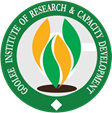
GENDER AND SOCIAL INCLUSION COURSE FOR NON-GENDER EXPERTS
INTRODUCTION:
The term gender has often been differently construed as many often imagine it is a women affair. The social constructs of gender roles and relations have marginalized certain groups such as women, ethnic minorities, and people living with disabilities among others. In recent years, the topic of gender has gained momentum among development and humanitarian actors. As a result, most governments and NGOs are now making deliberate attempts to ensure fair representation and participation of gender groups in projects. Despite these efforts, inclusion of the different gender groups still faces challenges due to ambiguity in strategy, as well as lack of technical expertise to enforce the right implementation. For development to be sustainable, the need to infuse gender awareness, and incorporating gender into programme design, implementation and evaluation of programmes is paramount without condescending and disenfranchising any gender group with social identity markers.
COURSE OBJECTIVES
- The course is tailored to introduce participants to important gender concepts (e.g. understanding the gender spectrum while programming, during implementation and during evaluation)
- To introduce participants to Gender & Social Inclusion Strategies (GSI), and their adoption in dealing with socially constructed gender biases in community programmes
- Participants will also be introduced to useful case studies on gender in international developments
COURSE OUTLINE:
1. Gender issues in rural development
- Understanding gender as a social construct and related basic gender concepts and terminology
- Theoretical and Historical perspectives of gender and development
- Contest over the term gender equality and gender equity as applied in rural development
2. Identification of gender needs and Analysis of gender issues
- Understanding types of gender needs
- Identification of issues for gender analysis
- Gender Analytical Frameworks and Tools
- Participatory Rural Appraisal Tools
3. Mainstreaming Gender in Programmes and Projects for rural development
- Gender mainstreaming as a strategy – A cross-cutting theme for Sustainable Development Goals (how and why?)
- Challenges to effective gender mainstreaming
4. Integration of gender equity and social inclusion aspects in global rural development landscapes
- Food security and nutrition, Value chains, Natural Resources, climate change, emergencies, and employment and livelihoods
5. Monitoring & Evaluation of Community Programmes with Gender Lens
6. Review of Case studies on best practices on gender, equity and social inclusion in rural development
EXPECTED OUTCOMES:
At the end of this training participants will be able to
• Clearly understand the concept of gender and the different gender needs;
• Describe the different gender frameworks and tools in development programmes;
• Understand the gender integration continuum and methodologies for applying gender and social inclusion strategies in development/humanitarian interventions
WHO SHOULD PARTICIPATE?
This course is suitable for participants who are not necessarily gender experts but have key responsibility to incorporate gender into their programmes. Specifically, the course could be relevant to project managers, gender officers, researchers, M&E officers, graduate research students, university lecturers among others.
FACILITATORS:
This course is facilitated by experienced and highly qualified (PhD holders), who are senior practitioners and gender experts. They walk the talk, and will inspire you to deconstruct any confusions around gender and how to implement social inclusion strategies. The passion and the experience the trainers bring is something to look for in the market.
COURSE DURATION AND MODE OF DELIVERY:
This is a 5 full days course involving instructor-led presentations, group assignments and presentations, role-plays, QA sessions, storytelling, participant experiences and breakouts.
COST:
The course costs USD 700 per participant/KSh 70,000 for residents (accommodation & other costs)
VENUE:
Nairobi, Kenya
REQUIREMENTS:
Participants are advised to carry a laptop for this course.
HOW TO PARTICIPATE:
In order to participate, please contact us on the following:
You can apply online at: www.gooleeinstitute.com/apply.php
Write to us on the email: [email protected] .
Call us on the Mobile: +254 721 445293
For other course: http://www.gooleeinstitute.com/pdfs/Course%20Calendar_2018%20final%20copy.pdf
Website: www.gooleeinstitute.com